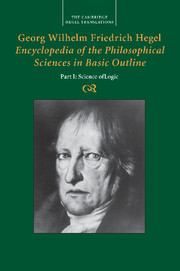 Georg Wilhelm Friedrich Hegel: Encyclopedia of the Philosophical Sciences in Basic Outline
Georg Wilhelm Friedrich Hegel: Encyclopedia of the Philosophical Sciences in Basic Outline Book contents
- Frontmatter
- Contents
- Acknowledgments
- Introduction: Hegel’s Encyclopedia Logic
- Translators’ Note
- Encyclopedia of the Philosophical Sciences in Basic Outline, Part I: Science of Logic
- Part I Science of Logic §§ 19–244
- Bibliography
- Glossary of Translated Terms, German to English
- Glossary of Translated Terms, English to German
- Index
Introduction §§ 1–18
Published online by Cambridge University Press: 30 September 2021
- Frontmatter
- Contents
- Acknowledgments
- Introduction: Hegel’s Encyclopedia Logic
- Translators’ Note
- Encyclopedia of the Philosophical Sciences in Basic Outline, Part I: Science of Logic
- Part I Science of Logic §§ 19–244
- Bibliography
- Glossary of Translated Terms, German to English
- Glossary of Translated Terms, English to German
- Index
Summary
§1
Philosophy lacks the advantage from which the other sciences benefit, namely the ability to presuppose both its objects as immediately endorsed by representation of them and an acknowledged method of knowing, which would determine its starting-point and progression. It is true that philosophy initially shares its objects with religion. Both have the truth for their object, and more precisely the truth in the highest sense, in the sense that God and God alone is the truth. Moreover, both treat the sphere of finite things, the sphere of nature and the human spirit, their relation to each other and to God as their truth. Philosophy thus may definitely presuppose a familiarity with its objects – indeed it must do so – as well as an interest in them from the outset, if only because chronologically speaking consciousness produces for itself representations of objects prior to generating concepts of them.What is more, only by passing through the process of representing and by turning towards it, does thinking spirit progress to knowing by way of thinking [denkendes Erkennen] and to comprehending [Begreifen].
While engaged in thoughtful contemplation, however, it soon becomes apparent that such activity includes the requirement to demonstrate the necessity of its content, and to prove not only its being but, even more so, the determinations of its objects. The aforementioned familiarity with this content thus turns out to be insufficient, and to make or accept presuppositions or assurances regarding it appears illegitimate. The difficulty of making a beginning, however, arises at once, since a beginning is something immediate and as suchmakes a presupposition, or rather it is itself just that.
§2
Generally speaking, philosophy may initially be defined as the thoughtful examination [denkende Betrachtung] of things. If, however, it is correct (as it probably is) that it is through thinking that human beings distinguish themselves from the animals, then everything human is human as a result of and only as a result of thinking. Now insofar as philosophy represents a peculiar way of thinking, in virtue of which thinking becomes knowing and a knowing that comprehends things [begreifendes Erkennen], its thinking will be different from the thinking at work in everything human and which, indeed, is responsible for the humanity of all that is human, even though it is identical with the latter such that in itself there is only one thinking.
- Type
- Chapter
- Information
- Georg Wilhelm Friedrich Hegel: Encyclopedia of the Philosophical Sciences in Basic OutlinePart I: Science of Logic, pp. 28 - 46Publisher: Cambridge University PressPrint publication year: 2010
